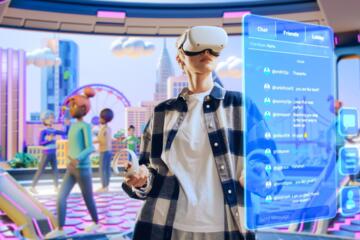What Exactly Is the Metaverse?
Let’s clear the fog.
The metaverse is a broad term describing a persistent, shared digital universe where users can interact with each other and with digital environments in real time. Think of it as the next generation of the internet—where instead of clicking through web pages, you navigate immersive 3D worlds.
It’s not one single platform, but a collection of interconnected digital spaces powered by technologies like:
-
Virtual Reality (VR) – immersive experiences using headsets
-
Augmented Reality (AR) – overlaying digital elements onto the real world (think Pokémon GO)
-
Blockchain – used for ownership and security (e.g., NFTs, virtual real estate)
-
Artificial Intelligence – powering avatars, environments, and automated interactions
-
5G and Cloud Computing – delivering seamless, real-time connectivity
Imagine walking into a virtual office, attending a concert from your couch, or shopping in a 3D store where you can try clothes on your digital avatar. That’s the metaverse in action.
How Will the Metaverse Affect You?
The metaverse isn’t just a cool tech trend—it could impact almost every part of your daily life. Here’s how:
1. Work Will Go Virtual (But Not in a Boring Way)
Remote work is already common, but the metaverse could make it far more engaging.
-
Hold meetings in 3D virtual rooms instead of flat Zoom calls.
-
Use digital avatars that reflect your expressions and gestures.
-
Collaborate on virtual whiteboards or product models as if you were in the same room.
Real-world example: Companies like Meta and Microsoft are already developing virtual office tools like Horizon Workrooms and Mesh for Teams.
Takeaway: You may soon “commute” to work by putting on a headset.
2. Social Life Will Extend Beyond Screens
From virtual parties to shared digital hangouts, the metaverse will offer new ways to stay connected—especially across distances.
-
Host virtual game nights with friends from different countries.
-
Attend live events, like comedy shows or concerts, as if you’re there.
-
Create and customize avatars to represent your identity however you choose.
Tip: Platforms like VRChat and Roblox already offer glimpses into social experiences in the metaverse.
Takeaway: Social interaction won’t be limited by location or physical space.
3. Education and Learning Will Become Immersive
Imagine studying the solar system while floating through it—or practicing heart surgery in a virtual operating room.
-
Interactive simulations can make complex topics easier to grasp.
-
Students from around the world can share one virtual classroom.
-
Language learning could include virtual trips to foreign cities.
Step-by-step impact:
-
Schools adopt VR tools.
-
Lessons become more interactive and personalized.
-
Students learn by doing, not just watching.
Takeaway: Learning could become more fun, accessible, and experiential.
4. Shopping Will Get a Digital Makeover
Tired of guessing if clothes will fit or furniture will match? The metaverse changes that.
-
Try on outfits using 3D avatars with your exact body type.
-
Preview how a couch looks in your living room with AR.
-
Attend virtual shopping events or interact with sales assistants in digital stores.
Tip: Brands like Nike and Gucci are already investing in virtual stores and NFTs.
Takeaway: Shopping could become more interactive and personalized than ever.
5. You’ll Own Digital Assets (and They’ll Matter)
With the help of blockchain, the metaverse allows for real ownership of digital items—be it clothing for your avatar, art pieces, or even land in a virtual world.
-
NFTs (non-fungible tokens) give you verified ownership of digital goods.
-
Virtual real estate is being bought, sold, and rented.
-
You could earn real income from creating or trading in the metaverse.
Caution: These markets are still new and volatile—research before diving in.
Takeaway: Digital assets could hold real-world value—and even become income streams.
Will Everyone Join the Metaverse?
Not overnight—and maybe not everyone. The metaverse faces real challenges:
-
Technology access: Not everyone has a VR headset or fast internet.
-
Privacy and security: More data, more risk—companies will need to protect users.
-
Mental health: Like all digital spaces, overuse can impact well-being.
-
Regulation: Questions around ownership, moderation, and digital laws are still being sorted out.
But just as smartphones went from luxury to necessity in a decade, the metaverse could become a daily part of life sooner than we think.
How to Prepare for the Metaverse (Even If You’re Not a Techie)
You don’t have to be a programmer or investor to get involved. Here’s how to ease in:
-
Explore existing platforms: Try out free apps like VRChat, AltspaceVR, or Horizon Worlds.
-
Create a digital avatar: Platforms like Ready Player Me let you make one in minutes.
-
Learn about blockchain basics: Understand how NFTs, wallets, and crypto work—even if you don’t plan to invest.
-
Stay updated: Follow reliable tech news sources or YouTube channels to see where it’s all heading.
Tip: Focus on usefulness, not hype. The metaverse is a tool—how you use it is up to you.
Final Thoughts: The Metaverse Is Coming—Ready or Not
The metaverse isn’t a distant dream—it’s already taking shape. Whether it transforms your workday, brings your friends closer, or changes the way you shop, it’s set to become a major part of the digital experience.
You don’t need to dive in headfirst, but being curious and informed now puts you ahead of the curve.
So next time you hear someone talk about the metaverse, don’t just nod politely—join the conversation. After all, it’s not just about the future of technology. It’s about the future of how we live.









